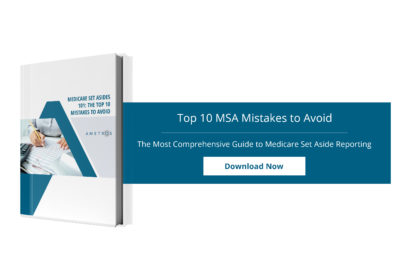With its recent issuance of a revised WCMSA Reference Guide¹ (with new guidelines around administration), an updated Self-Administration Toolkit² and the rollout of electronic submission of attestation information, Medicare is placing a greater emphasis on professional administration and the overall administration of Medicare Set Asides. Given this focus, it’s a perfect time to set the record straight on some common myths around administration.
Myth #1: The cost of items and services listed in an MSA is exactly the amount you’ll spend with providers and at the pharmacy = False
Fact: The services in a Medicare Set Aside (MSA) allocation and their associated costs are based on a case-by-case review with many different factors considered, including:
- pay histories,
- applicable fee schedules,
- evidence-based resources,
- provider charges,
- usual and customer rates, and
- unique Centers for Medicare & Medicaid Services (CMS) guidelines for costing MSAs
The actual cost of a post-settlement service, procedure or surgery may vary greatly from what was indicated in the MSA allocation report. In many instances, it’s possible for a professional administrator to obtain better pricing through its networks potentially saving or reducing the cost of medical treatment. As it relates to drugs in an MSA, prescriptions that are otherwise covered under Part D are priced using Red Book’s Average Wholesale Price (AWP) and generics are priced at the lowest non-repackaged price listed in Red Book. See WCMSA Reference Guide, v3.0, Sec. 9.4.6.1. Red Book is a source for pricing prescription drugs and compiles AWP for various drug products. This costing methodology for generic drugs can result in a situation where the injured individual is unable to attain it in the marketplace. Here, a professional administrator can also assist with its network of Pharmacy Benefits Managers (PBMs) to potentially obtain this drug at a lower cost, thus extending the life of an MSA.
Myth #2: Interest earned in an MSA fund that accrues is not taxable = False
Fact: The total MSA amount must be deposited in an interest-bearing account, separate from any other account such as a personal savings or checking. See WCMSA Reference Guide, v3.0, Sec. 17.2. While the MSA funds themselves are not taxable, the interest earned is taxable. Taxes must be paid on any interest and the tax owed on the interest from the MSA account must be documented. See WCMSA Toolkit, v1.3, Sec. 4. The MSA account may be used to pay for any income tax on interest from the MSA account. See WCMSA Reference Guide, v.3.0, Sec. 17.5.
Myth #3: An MSA can only be used for items and services specifically listed in the allocation report = False
Fact: An MSA allocates projected expenses for treatment, items and prescription drugs: 1) related to the underlying industrial injury; and 2) which are covered by Medicare. See WCMSA Reference Guide, v3.0, Sec. 3.0. “If the bill meets both conditions, you can pay it from your WCMSA account.” Self-Administration Toolkit for Workers’ Compensation Medicare Set-Aside Arrangements, v1.3, Sec. 6.
CMS stresses that:
It is not important if what you spend from your WCMSA does not match how you expected to spend it. For example, if your WCMSA is funded for $10,000, with $7,000 for prescriptions and $3,000 for medical expenses, and you spend $6,000 on prescriptions and $4,000 on medical expenses, you’ve still used the account correctly.
Self-Administration Toolkit for WCMSA Arrangements, v1.3, Sec. 8. If a treating provider indicates that a Medicare-covered item or service is related to the underlying work-related injury, the MSA account can cover that cost.
Myth #4: Traditional Medicare is not denying payments = False
Fact: Medicare is denying payments when they believe funds are available in an MSA account. “The WCMSA administrator must send annual attestations summarizing the account transactions to the contractor responsible for monitoring the case. The contractor is then responsible for verifying that the funds from the WCMSA were spent on medical services for Medicare-covered services, or to pay the tax for the interest income from the account. Additionally, the contractor must ensure that Medicare makes no payments related to the WC injury until the WCMSA has been used up. This is accomplished by placing an electronic marker in CMS’ systems used to pay or deny claims.” WCMSA Reference Guide, v3.0, Sec.18.0.
Attestation is critical in preventing Medicare from denying payments if the MSA account is temporarily depleted or completely exhausted. “CMS will continue to deny claims related to the WC injury until final exhaustion attestation is received and documented. Attestation is highly important to ensure claims are paid properly after exhaustion.” Self-Administration Toolkit for WCMSA Arrangements, v1.3, Sec. 8.
Myth #5: Medicare Advantage is not denying payments = False
Fact: Medicare Advantage Plans (MAP) / Medicare Part C entities receive information on submitted MSAs from CMS and are directed to deny coverage for treatment related to the underlying injury which is otherwise covered. While the details and information aren’t as robust as with traditional Medicare, MAPs are denying treatment and making better efforts to coordinate benefits with MSAs. In 2019, one-third (34%) of all Medicare beneficiaries are enrolled in a Part C plan and this number is anticipated to rise to nearly half by 2029. With continued growth and popularity of Part C, it is assured stricter compliance and tighter coordination of benefits will occur with respect to MAPs and MSAs.
Myth #6: Medicare recommends self-administration over professional administration = False
Fact: “Although beneficiaries may act as their own administrators, it is highly recommended that settlement recipients consider the use of a professional administrator for their funds.” WCMSA Reference Guide, v3.0, Sec. 17.1. Recently, in the same section of the updated Reference Guide, CMS also provide the first use case for highly recommending professional administration:
CMS highly recommends professional administration where a claimant is taking controlled substances that CMS determines are “frequently abused drugs” according to CMS’ Part D Drug Utilization Review (DUR) policy.
For an individual, administering an MSA is complicated and complex. CMS highly recommends professional administration because it provides the highest levels of protection for all settling parties and ensures proper care and coordination of benefits post-settlement.
Myth #7: Professional administration is only for injured individuals who lack the capacity to administer a post-settlement medical fund, such as an MSA = False
Fact: While CMS indicates an MSA should be administered by a “competent administrator,” it doesn’t limit the fact professional administration is highly recommended. CMS’s support for professional administration is not limited to a situation or classification of an injured party. When an injured party has an appointed guardian or has been declared incompetent by the court, the settling parties simply must include that information in their MSA proposal to CMS. WCMSA Reference Guide, v3.0, Sec. 17.1. However, there is not a single use case for when professional administration is highly recommended as CMS states: “[a]lthough beneficiaries may act as their own administrators, it is highly recommended that settlement recipients consider the use of a professional administrator for their funds.” Id. Professional administration can greatly help any injured party, regardless of their capacity or station in life.
Myth #8: Professional administration is only for MSAs = False
Fact: Professional administration can benefit any claims settlement that involves funds for post-settlement medical expenses. While professional administration can greatly assist all parties in an MSA, it can also provide support, potential savings and numerous other benefits for any type of post-settlement medical fund. Professional administration can ensure that public benefits are preserved, such as Medicaid, Social Security Disability Income (SSDI) and Supplemental Security Income (SSI). Moreover, through a professional administrator’s discount networks, savings may be realized which could greatly extend the life of the medical fund. A professional administrator can also assist with coordination of care so the hassle of medical bills and determining if treatment is or isn’t related is eliminated.
Myth #9: Attestation to Medicare doesn’t matter = False
Fact: Attestation is vital to ensuring that Medicare will not deny treatment. Submission of attestation information to Medicare is a critical component in administering an MSA. See Self-Administration Toolkit for WCMSA Arrangements, v1.3, Sec. 8. If there is an instance of either temporary depletion or complete exhaustion of the fund, a professional administrator can ensure that attestation and proper coordination of benefits occurs so that Medicare will not deny coverage. This is especially the case with MSAs that are funded via an annuity where there is a greater likelihood of temporary depletion depending on the pace and spend of treatment. Also, with the complexities of new electronic attestation submission to Medicare, a competent professional administrator with technical capabilities is in a better position to ensure that this occurs properly and removes the burden for an individual.
Myth #10: Professional Administration is costly = False
Fact: The cost of professional administration is typically a small fraction of the overall medical portion of a settlement. In many cases, professional administration is less expensive than the cost of an MSA.
This is a relatively small price to pay for, among other things:
- extending the life of the medical fund
- potential savings on costs for medical, prescription drugs and durable medical equipment (DME)
- finality to the settlement
- assistance to the claimant
- assurance funds will be spent properly
- ensuring attestation submission to Medicare will occur
- peace of mind to all parties
As CMS places a greater emphasis on MSAs and post-settlement administration requirements, it’s important that all parties have their facts straight to ensure they’re making the best decisions relative to the management and administration of an MSA post-settlement.
Read the full article on Workerscompensation.com
You May Also Like: The Top 10 MSA Administration Mistakes to Avoid
¹ Workers’ Compensation Medicare Set-Aside Arrangement (WCMSA) Reference Guide Version 3.3


